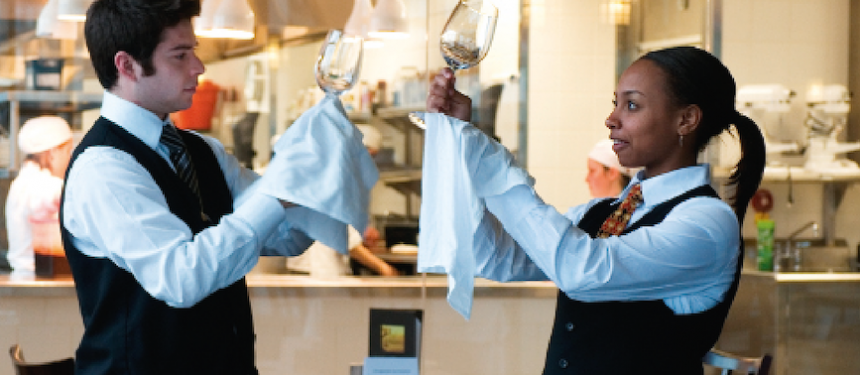Hospitality schools: priming global grads for wider management roles

Clearly, it’s a boom time for the sector and, consequently, hospitality schools are taking in students from an ever wider range of countries, with many schools reporting intakes originating from over 100 different nations.
At the same time, hospitality management courses are prized even more highly because well established companies like JP Morgan, Bloomberg, Disneyland and Louis Vuitton are frequently recruiting internationally-oriented future managers from them.
“We count very many alumni within senior management of the hotel and [the] larger hospitality or service industry”
The tourism and hospitality landscape is a fast-moving one: sustainability-aware, highly competitive (both in terms of recruitment and between industry players), and acutely challenged by managing big data to service customers who expect to be able to use technology for seamless and tailored travel.
Pioneering programmes
Les Roches Global Hospitality Education has pioneered a number of courses to tackle and anticipate the biggest challenges facing the sector. It hosts 90 nationalities with a significant 97% international student body.
To facilitate the labour flow to emerging markets, Les Roches has partnered with the Rwandan government to establish a hospitality management school in Kigali, now ready to take enrolments thanks to a number of graduated Rwandan MBA students who are managing the site.
Africa and Asia are definite growth areas for the Kigali school with visas much easier to come by, for example, than for non-Europeans wanting to work in Europe.
Meanwhile at its campus in Marbella, Spain, Les Roches offers new twists on usual programming: a specialisation in Strategic Human Resources Management is now part of its bachelor’s degree programme, nodding to the difficulty in attracting and retaining talent.
And a Postgraduate Diploma in Marketing Management for Luxury Tourism was developed in response to growing demand for premium travel experiences.
Service standards
Beyond new priorities, the number one focus remains customer service. Greta Musu, director of international business development at the hospitality management school, International Management Institute in Switzerland (where 97% of students are non-Swiss) puts the emphasis on the human touch.
“We were the first hotel management school to offer personal and professional development classes embedded in the curriculum,” she relates, “to ensure the students also develop their personal skills, which are extremely important in the hospitality industry.”
All institutions reference their balance between theory and hands-on practice, of course, in a sector renowned for its practical work experience.
At Swiss Education Group, for example, where students represent over 110 nationalities, work experience partnerships exist with major hospitality companies such as Four Seasons, Hyatt, Atlantis The Palm and Les Concierges.
“International students completing a degree programme are eligible to be employed for a period of one year”
In the US particularly, international students are attracted to Optional Practical Training programme, notes Dr. Susan Tinnish, dean at Kendall College School of Hospitality Management in Chicago.
“International students completing a degree programme are eligible to be employed for a period of one year under their student visa (F-1 visa),” she explains. “Our international students successfully work in the US and then leverage that experience in their home country or other places in the world.”
Global layers of accreditation
Where kudos is concerned, both Judy Hou from The Emirates Academy of Hospitality Management in the UAE and Musu at International Management Institute in Switzerland stress the importance of accreditation, and there are various global benchmarks.
Hou notes that her institution’s courses are ratified by what she believes to be an unprecedented three bodies: UAE’s Ministry of Higher Education and Scientific Research; The Institute of Hospitality and The International Centre of Excellence in Tourism and Hospitality, based in Australia.
Musu meanwhile notes that IMI offers “a combination of British academic excellence and Swiss practical experience”, with validating bodies including Manchester Metropolitan University and Oxford Brookes University.
Les Roches, meanwhile, is accredited by NEASC, the accreditation body for Harvard, MIT and Brown universities, among others.
Recruitment channels
The personal touch, as with the discipline itself, is paramount when it comes to international recruitment to hospitality schools.
Agents are neither the exception nor the rule in recruitment to the hospitality school sector, but many schools do suggest that reputation alone is enough to keep overseas interest flowing, with alumni as their ambassadors in many cases.
A unique understanding of the correlations between service and profit, quality and satisfaction
Ecole Hotelière de Lausanne (with a third of its students Swiss with France, Italy, China and the US being other top feeder countries) is one example of a company using an active network of 25,000 alumni as its main recruitment channel.
“We count very many alumni within senior management of the hotel and [the] larger hospitality or service industry and they generally maintain very close ties with the network, which makes them the best ambassadors for EHL,” says EHL’s CEO, Michel Rochat.
Such a breadth of nationalities intake shows just how important the emerging tourist markets are. With many students coming to study hospitality to run the family business or with independent entrepreneurial dreams, or entering the dynamic events sector, the challenge for schools is to keep pace with both the quantitive and qualitative aspects of the global demand.
EHL’s Master of Science in Global Hospitality Business launched last September, providing an international curriculum in partnership with leading hospitality schools in Hong Kong and the US, plus a three-month residency with an international hospitality company.
Tinnish believes that the industry’s focus on customer service enables it “to provide service expertise to other industries (financial services, health care, senior living)”, and it also has a unique understanding of the correlations between service and profit, quality and satisfaction, loyalty and productivity and how they link to “increases in growth and profitability”.
Little wonder then, that companies such as Disney, JP Morgan and Bloomberg are recruiting from hospitality’s talent pool. Perhaps the sector’s biggest worry is to avoid being a feeder pool for companies prizing leadership, management, finance and marketing savvy.
[Source:- Pienews]

